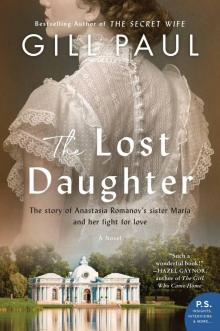The Lost Daughter Read online
Page 17
The doctor smiled, and she sensed an air of condescension. “That is not possible. You must have made a mistake over your dates.”
“I’m sure I didn’t,” she argued, remembering the night when she and Peter first made love by the fire in their mountain hideaway, several weeks after fleeing from Ekaterinburg. He had said it was the third of September.
“Premature babies have trouble feeding,” the doctor continued, “and they often have breathing difficulties.”
“No, he wasn’t like that . . .” Maria faltered.
“Then I doubt he was premature.” The doctor began to pack his bag, reiterating his earlier advice about water and dry biscuits. Maria’s ears were ringing so loudly she could not take any of it in.
As soon as he left, she lay on her bed, face to the wall, and tried to think. If Stepan was not conceived with Peter in the mountains, the only other possibility—unbearable, repulsive to consider—was that Bolotov had raped her during his attack in the Ekaterinburg bathroom. Her memories of it were hazy. She knew she had been very sore afterward but could only remember him putting his fingers there. They were standing up throughout, so how could he have inserted his seed in her? It was unthinkable.
She had wiped Bolotov’s image from her mind, but now she remembered his dark hair and thought of her dark little boy. She and Peter were both light-haired. “No. Please no,” she moaned. Katya and Irina resembled members of her or Peter’s family, but she could think of no one whom Stepan resembled, no other individual so dark. This was awful.
And then another thought occurred to her. Peter knew the ways of nature; he was aware of the normal length of a pregnancy and must have realized that Stepan had been born two months too soon. She remembered him saying that he came early because she needed him, but that was clearly nonsense. What did Peter believe? She thought back to the scandal after she kissed Ivan Skorokhodov in the hall at the Ekaterinburg house. Perhaps Peter believed Ivan was the father. Perhaps he knew the boy he was raising was not his own son. If so, in five years, he had not once mentioned it. His bond with their eldest was close and unshakable.
What kind of a man could raise another man’s son as his own and never once let it show in word, look, or gesture? Maria knew that if anyone could, it was Peter. She determined that she would never mention the topic herself, because poor innocent little Stepan must never know.
Chapter 26
Leningrad, February 1927
ON FEBRUARY 24, EXACTLY AS THE DOCTOR HAD PREDICTED, Maria felt the labor pains begin. Peter fetched the midwife and took the three younger children out for a walk in the snowy dawn. The baby came easily, after just a couple of hours, but he was quiet and the midwife had to hold him upside down and smack him till he breathed. When Maria held him in her arms and gazed down, she saw a face that looked like that of an old man, and got goose bumps on her arms.
“Hello, little one,” she whispered. “It’s good to meet you.”
She let Peter choose the name, and he decided on Pavel, which meant “small and humble.” Unlike her other babies, this one was difficult to settle and often cried for hours on end, despite her best efforts to soothe him. The midwife prescribed gripe water, but that made no difference. When she massaged his little belly with her fingertips, he screamed as if in agony. At last they decided to call the doctor, and he examined Pavel, checking his vital signs.
“The cord is not yet healed,” he said. “And he has a nasty bruise on his hip. Did he have a fall?”
“Definitely not,” Maria said. “I would know because he hasn’t been out of my sight since he was born.”
The bruise seemed to have formed where the sling she used to carry him pressed against him, so she tied it differently. When a new dark purple bruise sprang up straightaway, she guessed the truth.
In the back of her mind she had suspected it from the moment Pavel was born: he had the bleeding disorder that had marred the life of her little brother, Alexei. Known as hemophilia, it had been passed on from German relations on her mother’s side. As soon as she realized this, she knew that his cries were cries of pain, just as Alexei used to utter. His blood would not clot and the slightest bump could cause agonizing internal bleeding, but there was nothing that could be done except pray.
Her parents had believed in the powers of a spiritual healer called Rasputin, who they thought had brought Alexei back from the brink of death on at least two occasions. Maria knew no such healer—none would have been allowed to practice in this new Bolshevik society—but she prayed for her little boy to be spared suffering.
Peter was ashen when she told him. He had seen how ill Alexei was in the house in Ekaterinburg, and it was heartbreaking to imagine the same fate for their son.
“We will do our best to protect him,” he said. “Perhaps the specialists have some new medicines that were not available twenty years ago. I will ask our doctor to find out.”
But it was not to be. At the age of just six weeks, Pavel’s health deteriorated fast. He could no longer keep milk down, there was blood in his urine, and dark drops trickled from his nose. Maria tended him day and night, speaking in gentle tones, kissing his little face, trying anything she could to distract him from the incessant pain. He no longer had the strength to cry, but whimpered softly and gazed up at her, his eyes begging for help.
One gray morning she woke to find that he had died in the night and was lying beside her, cold and pale, and she knew her prayers had been answered. He would suffer no more.
“Go to my family, little one,” she whispered in his ear, because to her mind there was absolutely no doubt that he would be looked after in heaven by her parents and siblings who had died at Ekaterinburg. They would have scooped him up at the moment of death and would already be bathing him in their love, and the love of God.
* * *
Maria was floored by misery. She couldn’t stop thinking about little Pavel and wondering what he would have been like. Artistic, like her? Practical, like Peter? Or his own person entirely? Her breasts ached until the milk dried up, and a useless pouch of flesh hung on her belly, reminding her—if any reminder were needed—of the baby she had lost.
She had halted her search for missing persons during her pregnancy but now she began again, seeking distraction from her sadness. She made a card file, such as her father used to have in his old office at the Alexander Palace, and wrote the name and address of a missing person on each, then stuck on her quick pencil sketches and filed them in alphabetical order. As word spread, strangers came to knock on the street door of her apartment block and ask if she had heard of missing brothers, parents, aunts, uncles, or friends. If their information rang a bell for her, she checked her files and wrote out addresses. The number of successful reunions grew, and some grateful folk brought her gifts in thanks: hand-knitted cardigans for the children, jars of pickled vegetables, or a freshly caught fish.
Peter smiled indulgently and shook his head at his wife’s hobby. She was a friendly woman who enjoyed meeting new people, so there was no point trying to stop her. As time went on, the chances of her being recognized grew slimmer. His only concern, he told her, was that she didn’t get her hopes up about finding Tatiana.
“No, of course not,” she lied. Still, in the back of her mind, she hoped that someday Tatiana would hear of a Leningrad woman who specialized in reuniting families and come to ask for her help. The hope grew fainter over time, but it was her secret fantasy. As a child she had been taught that those who did good would get their reward in heaven, but she hoped God might see fit to send hers sooner. She had lost her family, and then lost a baby; surely it was her turn for some luck.
Both Stepan and Irina were at school now, and when Peter reported that a day care had been established at the pig-iron factory where Katya could be looked after during the day, Maria decided to apply for a job. She had no baby to care for, after all. The extra earnings would help to provide more food and clothes as the children grew. They only had one set of clothing and
one pair of shoes each, and it was a struggle to replace them when they wore out.
Before she started, Maria had little idea of what went on at Peter’s workplace, and she was taken aback by the rapacious roar of the blast furnaces, the scorching temperatures, the clanging of the huge belts that transported raw materials into the furnaces then conveyed the molten liquid into molds to set. She learned that pig iron got its name because the arrangement of the ingots along a thin runner was said to resemble a litter of piglets suckling at their mother.
At first her job was sweeping the floor rigorously to rid the factory of any contaminants that could affect the quality of the iron, but soon she applied for training in how to mend and maintain the huge traveling belts. It could be dangerous if hair or clothing got caught in these, and she was scrupulously careful about switching off the entire belt before attempting a repair. One woman who worked in the day care had lost a hand because she had not heeded this rule. The remaining flesh of her arm was folded around a stump that acted as a grim reminder to Maria every time she collected Katya from her care.
“Whoever would have thought a grand duchess would carry a spanner and oil in her overalls pocket?” Peter teased her in private. “Amazingly, you even know what to do with them.”
In truth, Maria seldom thought of her past now. Life was too full, with her job, her role as a mother and wife, her grief for Pavel, and her sideline in reuniting families. She soon became friends with several of her fellow workers in the factory, and many more came to her with stories of the missing until her card files numbered more than a hundred. One day, however, a wiry man with a salt-and-pepper moustache, whose job it was to stoke the furnaces, approached her pointing a finger of accusation.
“You’re the one!” he said. “You told my wife where to find me, and now my mistress has left me as a result. What right do you have to play with people’s lives? Did it not occur to you that some folk don’t want to be found?”
From then on, Maria only gave out information about people who had asked to be included in her card file. The last thing she wanted was to make enemies.
* * *
On his eighth birthday, Stepan had joined the Young Octobrists and had been given their five-pointed-star badge with a picture of Lenin on it. He always came home from meetings greatly excited by all he was learning.
“Mama, did you know that the last Tsar was an evil man, like an ogre?”
“Really?” Maria asked, with a straight face. “Why do you say that?”
“Because he and his family bought jewels and expensive cars while the poor people starved,” Stepan recited. “They lit cigars with thousand-ruble notes, and if the poor people protested, they shot them.”
Maria caught Peter’s eye across the table. She wanted to defend her family, to explain that they had been good people simply fulfilling the roles into which they had been born, but a slight shake of Peter’s head stopped her.
“I agree that things are much better for working people now,” she said. “Society is fairer.”
“We must all be prepared if the International Revolution is to succeed,” Stepan said, his brow furrowed in concern. “We are proler . . . prolerat . . .” He stumbled over the word. “Aren’t we, Papa?”
“Proletariat? Yes, we are, son.” Peter nodded.
Maria watched as Stepan played games of “Reds and Whites” with the other boys in the courtyard, reenacting scenes from the civil war, and worried about him growing up with Communism as his ideal. She would have loved to teach her children about religion, but Peter dissuaded her. Although there had been some relaxation of the ban on the Orthodox Church, religion was still seen as backward thinking, and it was better that their kids did not stand out from their contemporaries.
Since working out who must have fathered Stepan, Maria kept a close eye on her eldest, fearful that he might start to show negative character traits, but instead his personality grew increasingly like Peter’s: easygoing, calm, and rational. The two often went fishing together on Sunday afternoons, coming home with perch or roach for dinner, and laughing over shared fishing anecdotes: the big one that had nearly pulled Stepan into the river, and the immense trouble Peter took reeling in what turned out to be the wheel of a discarded bicycle.
Stepan’s schoolteacher stopped her one day, full of praise. “He is the peacemaker in the class,” she said. “If two boys are fighting, he will stand in the middle and urge them to shake hands. And when a girl in his class was bullied by some other children, he somehow made them stop. I asked him what he had said, and he told me, all seriousness: ‘There are right things to do in the world and wrong things to do in the world, and we must always choose the right ones.’”
The teacher chuckled at such wisdom from one so young, but Maria got shivers down her spine. Those were the exact words Peter had uttered when she’d asked why he’d rescued her from the forest. Stepan was Peter’s son through and through, no matter what had happened before he was born.
* * *
Raisa stopped Maria on the stairs one day. “You remember I told you that Vladimir from apartment thirty-seven had gone missing and I heard his dog whining through the door?”
“Yes. Is he back yet?” Maria asked.
Raisa shook her head firmly. “He won’t be coming back. I heard from Luba, who heard it from her husband, who is in the police, that he was arrested trying to cross the border into Finland.”
“Really? I wonder why he wanted to go to Finland?”
“The reason hardly matters, does it? The law is the law and citizens are not allowed to travel overseas without the correct documentation. He has been sent to a labor camp, I hear. The Solovetsky camp in the White Sea.”
Maria hated Raisa’s self-righteous tone. “What happened to the dog?” she asked. Her children would love a dog, but their living space was too cramped and there were five mouths to feed.
“Someone broke down the door and cut its throat because the whining was stopping people getting any sleep.”
Raisa’s eyes were cold and she showed no emotion: the dog was making a noise, therefore its throat was cut; Vladimir tried to leave the country so had been sent to a labor camp. Her complete lack of empathy, and her conviction of her own moral rectitude, was chilling.
Chapter 27
Leningrad, 1928
MARIA WAS TERRIFIED WHEN SHE FOUND SHE WAS pregnant again. What if this one also had hemophilia? What if he died too? When a boy they called Mikhail was born in March 1928, she watched like a hawk for any signs of bleeding. Every day when she left him in the day care, she feared he would not be breathing when she returned, but he survived his first six months without incident and she began to relax.
She would have preferred to stop working and care for her baby herself, but they needed the money. Nine-year-old Stepan had a voracious appetite, and all the children outgrew their clothes each season, so when General Secretary Stalin asked citizens to volunteer to become “shock workers,” who labored longer and harder than everyone else, Peter decided he would apply.
Maria argued against it. “I don’t see how you can possibly work harder than you do already. You’ll run yourself into the ground.”
“My darling Maria, who is never happy unless she has something to worry about,” he teased. “Think of it as a promotion: I will have more responsibility and my family will enjoy a better standard of living.” He pinched her chin between his finger and thumb and kissed her.
“Ask the boss if you can have more holidays. Tell them your wife insists,” she said.
Peter rolled his eyes. “I’ll send a telegram to General Secretary Stalin. I’m sure he’ll understand.”
He was accepted as a shock worker and part of their reward was an apartment with three bedrooms on the second floor of the same block. It felt like a palace: the boys slept in one room, the girls in another, and Peter and Maria in the third, so they had a little more privacy. They received coupons for new winter coats and valenkie, the cozy felt boots that we
re worn under galoshes on snowy days, as well as trousers, skirts, and shirts. Peter worked longer shifts, though; it used to be four days on, one day off, but now it was six days on before the day off. Maria felt his absence keenly, but he reacted with his usual equanimity.
“I’m happy as I am,” he said, and she knew it was true. His family was the center of his world and he would have done anything for her or any of their children.
In early 1931, Maria was careless over the dates on which they made love, half thinking she was too old to get pregnant at the age of thirty-one and half wanting another baby. Within a few weeks she knew she was expecting again, a baby who would be her sixth child, the fifth living one. Yelena was a round little dumpling, the biggest of her babies, with chubby cheeks and bracelets of fat at her wrists. There was no question that she was healthy. She greeted each morning with a cheery smile and beamed at strangers in the street. “What a lovely baby,” they said, and Maria glowed with pride.
Peter doted on the little one, whispering to her, bringing out the wooden toys he had made for the others, writing another letter to his mother and sister with no return address, but in private he said to Maria, “I think five is enough, sweetheart. Don’t you?” and she had to agree.
As she fed Yelena, it came to her in a flash of insight that she had subconsciously re-created the family she had lost: that had consisted of four girls and one boy, whereas she had three and two. Perhaps the idea had been buried in the back of her mind all along.
* * *
One evening, while Maria was bathing the baby, there was a sharp knock on the door. She wrapped Yelena in a towel and went to open it. One of the local Party bosses and his sidekick—an unpleasant pair if ever there was one—were standing in the hallway.
“Citizen Dubova,” the boss said, glancing coldly at the wriggling baby, “we have heard a report that you keep a card index of citizens’ private details and we wish to examine it.”
“Why?” She was puzzled. “Have you lost a family member?”

 The Collector's Daughter
The Collector's Daughter The Lost Daughter
The Lost Daughter Jackie and Maria
Jackie and Maria The Affair
The Affair Love...Maybe
Love...Maybe The Secret Wife
The Secret Wife No Place For a Lady
No Place For a Lady Another Woman’s Husband
Another Woman’s Husband World War I Love Stories
World War I Love Stories World War II Love Stories
World War II Love Stories